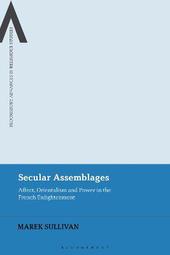
|
Secular Assemblages: Affect, Orientalism and Power in the French Enlightenment
Paperback / softback
Main Details
| Title |
Secular Assemblages: Affect, Orientalism and Power in the French Enlightenment
|
| Authors and Contributors |
By (author) Marek Sullivan
|
| Series | Bloomsbury Advances in Religious Studies |
|---|
| Physical Properties |
| Format:Paperback / softback | | Pages:264 | | Dimensions(mm): Height 234,Width 156 |
|
| Category/Genre | Humanist and secular alternatives to religion |
|---|
| ISBN/Barcode |
9781350272361
|
| Classifications | Dewey:211.6094409033 |
|---|
| Audience | | Tertiary Education (US: College) | | Professional & Vocational | |
|---|
|
Publishing Details |
| Publisher |
Bloomsbury Publishing PLC
|
| Imprint |
Bloomsbury Academic
|
| Publication Date |
27 January 2022 |
| Publication Country |
United Kingdom
|
Description
In this book, Marek Sullivan challenges a widespread consensus linking secularization to rationalization, and argues for a more sensual genealogy of secularity connected to affect, race and power. While existing works of secular intellectual history, especially Charles Taylor's A Secular Age (2007), tend to rely on rationalistic conceptions of Enlightenment thought, Sullivan offers an alternative perspective on key thinkers such as Descartes, Montesquieu and Diderot, asserting that these figures sought to reinstate emotion against the rationalistic tendencies of the past. From Descartes's last work Les Passions de l'Ame (1649) to Baron d'Holbach's System of Nature (1770), the French Enlightenment demonstrated an acute understanding of the limits of reason, with crucial implications for our current 'postsecular' and 'postliberal' moment. Sullivan also emphasizes the importance of Western constructions of Oriental religions for the history of the secular, identifying a distinctively secular-yet impassioned-form of Orientalism that emerged in the 18th century. Mahomet's racial profile in Voltaire's Le Fanatisme, ou Mahomet (1741), for example, functioned as a polemic device calibrated for emotional impact, in line with Enlightenment efforts to generate an affective body of anti-Catholic propaganda that simultaneously shored up people's sense of national belonging. By exposing the Enlightenment as a nationalistic and affective movement that resorted to racist, Orientalist and emotional tropes from the outset, Sullivan ultimately undermines modern nationalist appeals to the Enlightenment as a mark of European distinction.
Author Biography
Marek Sullivan is a Research Assistant at the University of Oxford, UK. He is also a Managing Editor of the Journal of Secularism and Nonreligion and a former Editor-in-Chief of The Oxonian Review.
|